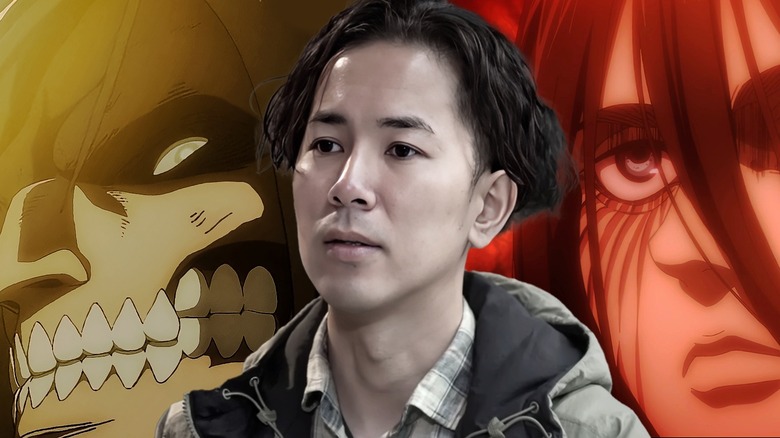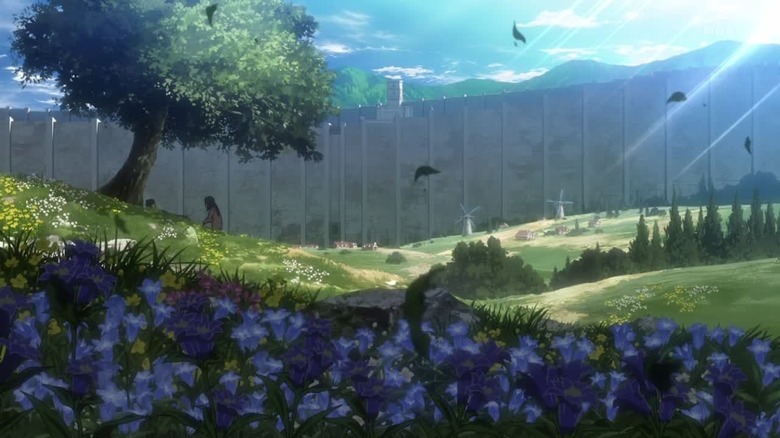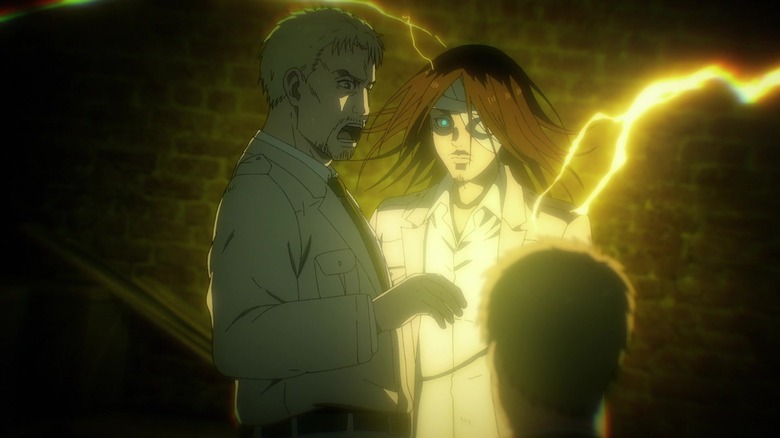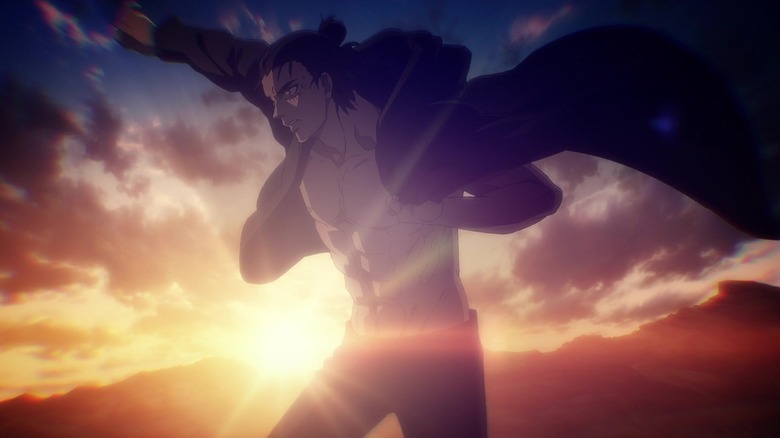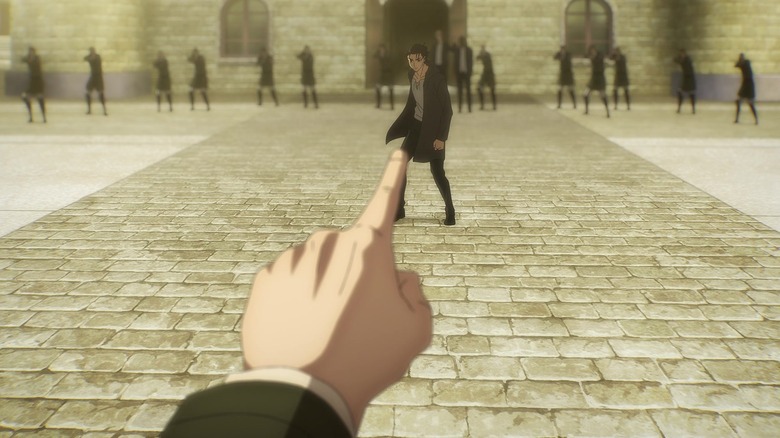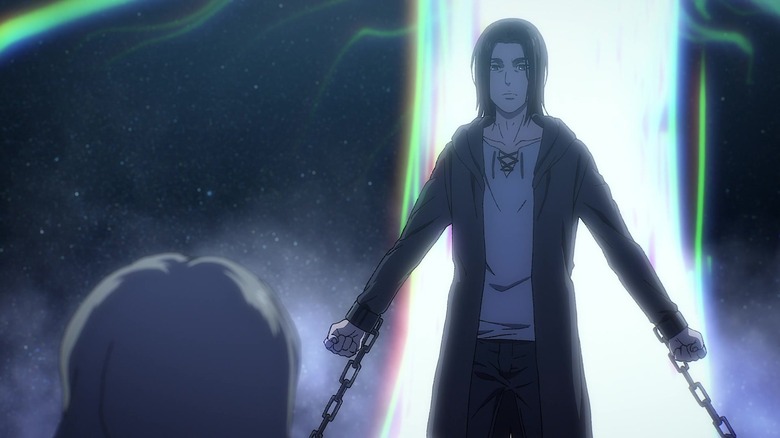Attack On Titan's Creator Isn't Afraid To Get You Angry & That's Why He's A Storytelling Genius
Taking risks should be the goal of every artist — particularly one who wishes for their work to endure amid an ever-growing array of storytelling options, and an ever-decreasing attention span. The purpose isn't to make fans happy. Quite frankly, if a reader does not like a book, there's no shortage of others to select from. So, to truly make works that matter, an artist has to have conviction in their creative vision and focus on what the art piece needs, rather than what the masses want.
Manga artist Hajime Isayama has achieved what many aspiring mangaka can only dream of — worldwide success and widespread love for his story. It's a story he began when he was in his early 20s, still struggling to capture the interest of editors and publishers. In fact, his personal journey, from zero to global recognition, should serve to tell other aspiring artists that no matter how many times the doors get shut in your face, you keep fighting and moving forward, very much like a certain protagonist (minus the carnage of global genocide). The mangaka even admitted to almost giving up at one point, once saying that, "I thought, I'll go to one more publisher, and if they reject me, my dream is pretty much over" (per Popverse).
It is not too bold to speculate that every "Attack on Titan" fan would feel like the world would be a little emptier if such a story had never seen the light of day. But what is it that makes Isayama's work so special? Is he still so special even after making so many fans angry at the way in which he brought his epic narrative to a close? Or, perhaps, does that anger illustrate just how great a storyteller he truly is?
What's so great about the storytelling in Attack on Titan?
If one were to introduce the story to a newcomer without giving away spoilers, "Attack on Titan" would appear to have a fairly simple premise: For 100 years, humanity has lived inside these three huge walls to escape the scary man-eating Titans who roam outside. Indeed, at first glance, "Attack on Titan" appears to hinge on a relatively uncomplicated concept to grasp.
However, once you start peeling back the layers, the complex machinery beneath this simplistic surface reveals itself. As you dive deeper, the thematic consistency, from plot point to plot point, wraps every story element tightly together. One among the many examples of this can be found, for instance, in how the words "fight" or "freedom" keep acquiring new dimensions as the series progresses. It's a narrative that was clearly planned out from the start, as foreshadowing in the early episodes pays off spectacularly, meaning that the rewatch value of "Attack on Titan" is quite high.
This thematic consistency was evidently something tht Isayama tried to prioritize. His vision was clear and thus he was not going to be persuaded to sacrifice it for anything — not even fans' wants and expectations.
While the execution of the series' ending may not have been flawless, Isayama never betrayed the soul of the story he conceived. To be unfailingly loyal to one's vision is a hallmark of any storytelling genius — though that does not mean the artist's confidence never wavers.
Isayama has been open about his insecurities with the ending of Attack on Titan
It is no secret that the ending of "Attack on Titan" is considered controversial. Hajime Isayama knows this better than anyone and, while he did not sacrifice his creative vision, that does not mean he was not shaken by the force of the backlash he received. Prior to attending Anime NYC, the manga creator issued a statement through publisher Kodansha stating that, although he was excited to meet his western fans and hear their honest opinions, that "I would appreciate if you'd be kind to me." This clearly implies that the artist had already been met with his fair share of hateful criticism.
That being said, many fans' love for the mangaka and his epic story has not been shaken in the slightest. At Anime NYC, in fact, after crediting voice actor Yuuki Kaji for his positive influence in the portrayal of Eren, Isayama said: "I still have my doubts within myself. 'Did I land it?' I'm not even so sure. I still struggle with this point and I'm very sorry about that."
The moment that followed was deeply moving. After a resounding "Aww!" from the audience, someone amongst the crowd shouted, "We love you!" which brought a genuine wide smile to the mangaka's face, who gratefully bowed, and barely held back tears.
Attack on Titan walks in the mighty footsteps of genre-defining works like The Empire Strikes Back
It is not surprising to see Isayama's emotional reaction to the hate he's received. As a human being above everything else, it may have taken Isayama a while to be able to digest the tsunami of criticism aimed at his series' conclusion, particularly from his western audience. It's worth noting that not only does it take time for an artist to come to grips with such an intense backlash to a decision they made in their popular product, but it also takes time for said product to reveal its full relevance in the grander scheme of its own genre.
Want a good example? Look no further than the shocking ending of "The Empire Strikes Back." For those alive in 1980, the way they felt when they left the theater — or even days after — is very different from how we feel about it today. Nowadays, it is incontestable how impactful the "Star Wars" sequel's ending was on fans' collective consciousness, and the film industry, but at the time, the movie's downer conclusion was divisive, with some fans arguing at the time that Vader was lying to Luke about his parentage in an effort to persuade him to the Dark Side. That take, obviously, didn't age well. "The Empire Strikes Back," meanwhile, aged spectacularly.
The truth is that people can become frustrated when a story does not give them what they want. In certain situations, like Isayama's polemic finale, it's almost like dehydrated fans are given glasses of water, only to realize it's salt water. In a rage, they break the glass — without noticing the fountain nearby, in which they could've used the now-shattered glass.
The final arc of Attack on Titan's divisive nature
A quick web search can tell you that, as much as some fans disliked the ending of "Attack on Titan", there are also those who loved it, which is a testament to its highly divisive nature.
It is often easy to mistake an ending one didn't like for a poor ending. There is no parallel universe wherein the overarching narrative of "Attack on Titan" could be considered "poor." Granted, the final arc had its issues, specifically if one were to look at chapter 139, which we won't spoil for non-manga readers. The execution of the ending might not have been perfect, but those who followed the story since the beginning should know that we witnessed a masterpiece being built before our eyes, one chapter at a time. Precisely because of this, one can only imagine the insane pressure Isayama had to deal with when bringing his story to an end, and how that may have impacted his physical health.
Was the final arc of "Attack on Titan" perfect? There are a few valid arguments as to why, perhaps, it wasn't. Was a perfect ending for such an intricate story easy to achieve? Titans, no! Not by any stretch. But while it may have failed in some respects, it would be unfair to base one's view solely on the emotional reaction one had when experiencing the ending for the first time. Even more unfair still would it be to come after the author for the decisions he made in how he wrapped up his own story.
Great storytelling, as embodied by Attack on Titan, is both a gift and a curse
Some fans rightfully acknowledge how difficult it is to end such a popular and influential series, especially one that has lived off its many mysteries and complexities — all of which must, ideally, be brought to a full circle. It wouldn't have been possible to create such an intricate and nuanced narrative had Isayama not thought deeply about how to connect the story's many elements. The meaningful phrases which carry the story's themes throughout the story — such as the idea of "being born in this world," or how one "cannot hope to bring about change if unwilling to sacrifice anything," are manifestations of the storyteller's true mastery of the artform.
More than a fictional story to tell, Isayama had something worthwhile to say about humanity, and the inner workings of our real world, through the narrative of "the devils of Paradis," and how, as Gabi realizes, there were never really any devils — only people.
It is fair to say that his story-crafting and world-building genius was both Isayama's gift and curse. However, as time passes and emotions die down, it will be easier to take an objective look over the series as a whole. Being human, Isayama may not have managed to make the perfect story from the first to the last panel, but he had the guts to stick to his story and its themes no matter what. That, above all else, makes him a masterful storyteller.
